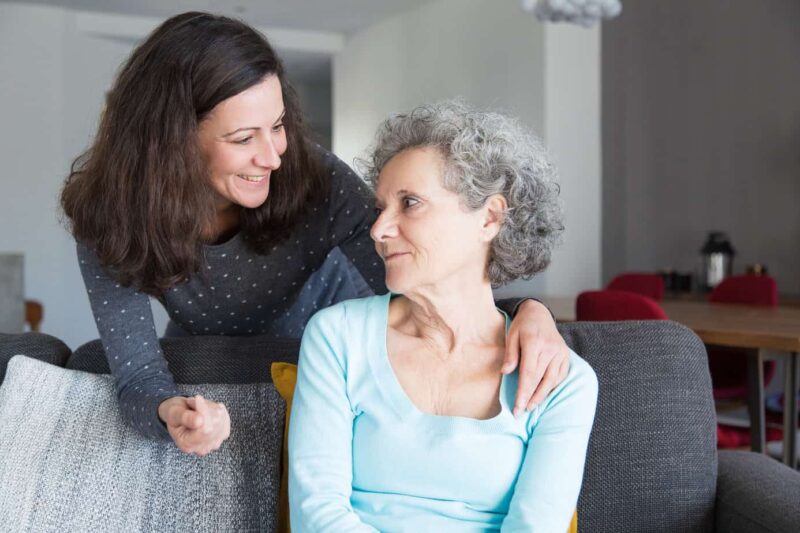My mother was my best friend.
I told her everything.
She was my rock and my strength.
I’d reach for the phone and call her whenever I was stuck or couldn’t find an answer or just needed to confide to another human being.
I got so used to her picking up on the first ring that I took her for granted.
I thought she’d always be there.
But in 2019, my whole world crumbled after learning that she had terminal cancer.
She had zero symptoms, and while she was visiting me, my older dog kept sniffing at her chest and watching her with sad eyes.
This frightened my mum, and she went back home and got a test.
She was tested positive for breast cancer, and it had already metastasized. In laymen’s terms, her breast cancer was in the fourth stage.
It had already spread to her bones and her organs.
What would follow were two years of topsy turvy moments and finally, death.
In this post, I will talk about how to deal with watching your mother die.
Trigger warning:
Now, because this topic is emotionally heavy, I am giving you a trigger warning in advance.
Please only continue reading if you are emotionally equipped to handle it.
I will be covering topics related to cancer and death, as well as the grief that accompanies it.
Let’s begin.
But before that really quick, get my free guide on how to really reset your life.
This post contains affiliate links, meaning I may make a commission at no extra cost to you if you decide to click on a link and purchase something. Click here to read the full disclaimer.
How to deal with watching your mother die
A little back story
This post is based on my personal experience of watching my own mother deal with cancer and eventually losing her life to it.
I’m just going, to sum up, those 2 years before moving on to how I managed to cope with everything and give you my solemn advice.
When my mom was diagnosed, both my dad and I were shaken.
My parents didn’t have much knowledge of cancer, and me being their only child, had to undertake the responsibility of not only choosing the best path to take medically but also educating them about:
- What cancer was
- What were the next steps, and how each decision would affect them
Her cancer was hormonal, and after doing a lot of research, I brought her to India as the doctor told me he could give her more than 6 months.
He gave her 2 years.
My parents packed their bags and left the country they’d lived in for 30 years just to continue her treatment.
For a whole year, she was on just tablets and no chemotherapy. The tablet regulated her hormones. It basically cut off the food that her cancer needed to thrive. Her cancer was a rare type, and she got lucky.
Although, the doctor had warned me that one day her cancer could get smart and start feeding off another source.
One week nearly a year later, she started getting weaker. She started losing a lot of weight, and her teeth started falling off.
She lost about 7 teeth that week.
We couldn’t even take her to the doctor because we were on a nationwide lockdown. It was in the middle of the pandemic that this happened.
We were quite literally stuck.
For the next 3 months, I related everything on the phone to the doctors, and they genuinely believed it was her advanced diabetes and diet that were causing this. No one suspected her cancer.
Once the lockdown lifted, we took her to the doctors, and they confirmed that cancer had indeed shifted its food source and it was now progressively getting worse.
We started her on heavy rounds of chemotherapy, and I was quite literally watching her die.
My once bright and uppity mom, who loved going to the office and working and then coming back home to cook for us, now struggled to get off the couch.
Cooking and playing candy crush were the two things she loved doing the most.
I wasn’t living with my parents. They eventually moved to another city in India to pursue a more experimental drug that we had to import from the UK.
Each injection (that she required) cost upwards of $570.
Although both my parents were confident that she would fight and conquer this, I could clearly see she had very less time.
I’d visit them often and each time, I observed her further deterioration.
My parents are strong Catholics, and they believed that prayer would save her.
It was hard for me to have to gently break it to them that she didn’t have much time.
They didn’t really want to make peace with it, and that’s okay.
Eventually, my mum was bedridden.
She couldn’t move without our help, and she had to wear diapers.
She lost interest in food, something I knew was a sign she was reaching the end.
We moved closer to the hospital (just 1 min away by car) to keep moving her in and out seamlessly without traveling.
And she’d be in the hospital for days, recover slightly so we could bring her home for a week before admitting her again.
Death was slow.
And as much as I wanted my mother to live, I didn’t want to watch her suffer.
Exactly 1 month before her 60th birthday, 2 years after she was diagnosed with 4th stage breast cancer, she breathed her last.
The last 6 months were torturous for us all:
- For my mum, because of the physical pain, she had to go through and the emotional pain of knowing that she was going to leave my father and me
- For my dad, because he couldn’t even comprehend how he was going to live his life without her and because he felt helpless that he could do nothing to make her better
- For me, because I had to watch the one person I loved so much die at an abnormally alarming rate and to see my dad (a person who I considered to be very strong) just crumble away with anxiety and depression.
When you watch a parent die slowly, it’s not just your parent that suffers.
Everyone who is close to your parent will go through some sort of pain – be it physical or emotional, or mental.
The reason I am writing this post is that there really is no manual for this kind of pain.
It’s more about winging it and trying really hard not to let your pain overtake you.
So, let’s really get into how to deal with watching your mother die.
1. Know you are not alone
Everyone on this earth has or will at some point lose their mother.
Sometimes people die instantly, and sometimes they don’t.
Death comes swiftly to some people, and for some, it is delayed.
This is one of the advantages and disadvantages of modern medicines – it can really push death away for a long time, but it will also mean much more prolonged suffering.
It is important to note that everyone has or will go through this pain at some point.
Losing a person who has brought you up and loved you is hard.
Maybe your relationship was strained, and maybe it wasn’t perfect.
It still doesn’t take away from having to watch her die slowly.
Just know that death is inevitable, and it will happen to all of us, regardless of age or race.
Millions of people have walked these steps before you, and millions will do so after you.
So, at no point should you let your feelings make you feel alone.
You are not alone.
2. It is okay to cry
You are going to feel a range of emotions during this time.
This is not a situation anyone wants to be in.
Your parent is neither live and hearty nor are they dead.
They are in limbo.
Caught in the middle, precariously hanging on a very steep cliff.
They can fall either way.
If you already know that your parent will die, then you are prepared with that knowledge.
If you do not know the outcome, you must learn to make peace with that.
Take a few moments in a day to cry.
I usually chose to do this right before I slept.
You may feel rage or sadness or just feel numb.
It’s okay, either way.
These are all normal signs of grieving and depression.
It is quite normal to go through several emotions during this time, and it’s alright to feel like your world has become dark and is ending.
It only feels that way, your world is not really ending.
So, let yourself cry.
It’s okay to feel pain and start envisioning the worst.
Just don’t do it all the time.
Keep a special time to grieve and think about what you and your family are going through.
Take it out healthily.
- You can write your feelings in a journal.
- You can meditate or read books about loss and losing loved ones.
- You can talk to family and friends to help yourself feel better.
3. Take care of your health

I’d spend all day with my mother in the hospital, and I’d let my dad take the night shift – this way, we were both well-rested to take our shifts without breaking down physically.
Please understand that if you do not take care of your health, you cannot take care of your parent, that needs you to be alert and there for her.
Don’t just drown yourself in coffee and go days without sleeping.
It is going to destroy you.
You need to take breathers.
You can hire a 24/7 nurse to take care of your parent, and you can sleep in the same room as your mother or sleep in the next room.
You can spend a large portion of your time with your mother. But do not try to “stay awake” for as long as she’s sick.
She is going to be sick for weeks or months or, in some cases – years, you cannot stay awake for that long of a duration.
It is not practical.
4. Do not neglect your responsibilities
There will always be problems in our lives.
And while it’s okay to take breaks so that we can heal, it is important not to neglect our primary responsibilities just because a huge part of our world is shutting down.
If you have children, ensure that there is someone to take care of them.
If you have a partner, talk to them and ensure they know how you are feeling.
We often feel like shutting ourselves away from the rest of the world when we are grieving, but this will only make things worse for the people who are close to us.
Talk about your feelings and learn to normalize these kinds of feelings.
Your partner or your children will be able to understand that you are in pain whether or not you discuss your feelings.
Ensure your employer understands you won’t be able to commit to new projects fully. They will be more understanding of allowing you to miss work.
At the same time, if you have pets and cannot care for them, hire someone to look after your pets while you are in the hospital caring for your parent.
5. Take it one day at a time
This may sound like horrible, cringe advice.
But this sentence kept me sane.
It became my mantra.
Especially when things became so overwhelming for me to handle.
Between hospital visits, taking care of my pups, bus trips up and down between 2 cities and handling my work and my father, I was a mess.
I didn’t know what the next day would bring, and I had zero knowledge of what to expect.
That’s when I’d close my eyes and bring myself to my center.
You cannot think of 100 different things.
You cannot do every single thing at one moment in time.
It’s not humanely possible.
That’s it, isn’t it?
We are human.
When you are doing something, give it your sole 100% attention.
If you are caring for your mother, do just that.
When you are eating and sleeping, give yourself that time to recuperate and rest.
You cannot take care of your mother if you don’t take care of yourself.
Make sure that whoever else is looking after her (your dad, or sibling or nurse) is well-rested too.
Allow them time to recuperate as well and take shifts.
Take it one day at a time.
Do not think about two years ago or two weeks in the future.
You only have this moment right here and now.
6. Be grateful for what you have
It’s very easy to go down the comparison road and start thinking, “Nobody else is going through what I am; why am I going through this?”
No.
We cannot question whatever is happening.
Please know that nobody up there has some personal vendetta against you or your mother.
This is just a natural phase of life.
Everybody dies.
Everybody dies at some time.
We are all given a few moments of life – some longer than others.
All we can do is be grateful for what we have.
Thank your stars that you got to spend time with your mother. Think about all the good times you both have shared.
Think about how you will carry those memories with you forward so you will always treasure her.
Spend whatever time you have now with her.
Every single moment is precious.
7. Treat her as you normally would

Don’t talk about death if she doesn’t want that.
Some moms make peace with their death, some don’t.
To each their own.
If you have tried your best, so be it.
Just talk about whatever she wants to talk about.
Give her that.
Talk to her normally.
Do not treat her like a sick patient.
My mom hated sympathy and pity – she didn’t tell anyone about her cancer. I had to break the news to hundreds of people, including her own family and friends, after she had died.
But it was what she wanted and what she preferred. So, I gave her that.
Do not try to correct your mom or belittle her thoughts.
Our moms come from a different generation and they see death differently.
It’s alright.
8. Do not beat yourself up for the past
It’s okay if you’ve made mistakes.
Don’t beat yourself up for them.
Regrets are normal.
Maybe we had fights with our moms in the past.
Maybe there were things we said, we wished we could take back.
That’s what death is all about – it helps us remember what is really important.
It brings clarity and perspective.
But please remember, that you cannot change the past.
All you have is the present.
You cannot control the future either.
So, stop beating yourself up for mistakes you made.
At that time, those decisions were made with the resources you had.
Maybe you didn’t know better or maybe you were just naive.
It’s okay.
Let it go.
And focus on the present.
That’s all you have in your control.
8. Give in to her whims
Your mom will start making demands and requests that may not be the absolute best for her.
My mom wanted to eat sweets in her last few weeks.
Sweets would raise her blood sugar and really made it hard for us to administer chemo. It was a never-ending battle of chemo and steroids towards the end.
We knew it was not really working in her favor, but we also understood that she didn’t have much time left, and she wanted to really enjoy her last few weeks eating food she’d not likely be able to taste later, so we gave in.
My mom also wanted more pain medications, and I gave them to her.
If you know that she is going to lose eventually to the disease, let her have a few extra pain medications.
Your mom wants comfort at this point, and she doesn’t want to be in pain.
9. Be with her
She may not be able to talk or give you quality time, but just sitting with her will make a world of a difference to her.
If you have a book or a laptop, just do your own work at her side but give her company.
Talk to her if that is something she genuinely enjoys; you can even tell her stories.
Although I am not religious, I recited prayers to make her feel better.
At this point, your mother comes first.
Just focus on making her happy.
Putting your parent’s emotional needs before yours will also give you the emotional strength to handle this roller coaster.
It’s a surprising but helpful note.
9. Knowledge will help you make peace with the inevitable
Even though it’s very hard to make peace with your mother’s health, try to stay on top of things.
Keep talking to the doctors and nurses and ask questions with an open mind.
Do not show your negative emotions to the doctor.
When you cry or behave anxious with the doctor, they may tend to spare your feelings and lie to you.
You do not want this.
The truth will help you make better and more informed decisions.
So, ask questions and be extremely rational and logical with the doctors.
Show them that you trust them and their decisions and try to understand what are the best steps to take moving forward.
This will help you know what to expect next and will help prepare you for the inevitable.
In my case, I had an aunt (my mother’s sister) who was very rational and told me what would happen next.
Although it was distressing to see my mother lose her senses and become blind in the last 2 days of her life, I knew that this was to be expected because the cancer was moving to different parts of her brain.
10. Keep talking to your family
Your communication is the one thing that will help all of you get through this.
Not everyone in your family may take this news well. And not everyone may grieve like how you are.
So, be kind and be accepting.
Keep your lines of communication open, and do not get frustrated when people ask questions.
Some questions may seem trivial, but please understand that not everyone handles bad news well.
So, try to be patient and do not lose your temper.
Make sure that everyone who needs to know about her well-being is well-informed and knows exactly what is going on.
Do not give relatives false hope and try to “spare their feelings.” This is not the right way to go about death.
If the calls are getting too much, then send a personal message requesting more time and just switch off your phone.
Spend more time with your mother and immediate family.
11. Know that you will be okay
Although things might seem dark and dreary right now, know that you will get through this.
You will survive.
Pain only feels like it’s going to kill you, but more often than not, you will come out of this stronger and more resilient than before.
I never expected to lose my mom when I was 28 years old.
For me, it seemed like I didn’t get to have her long enough.
But with time, I was able to make peace with it.
As of writing this article today, it has been 1 year and 2 months since my mother died.
I still miss her, and I think about her every day.
But the pain has gotten less.
Some days are definitely harder than others.
Life goes on, and people will enter and exit your life as you keep moving forward.
It’s just the natural phase of life.
You are going to get through this.
And as cliche, as it sounds: Time really does heal all wounds.
Conclusion
I am really sorry if you are reading this post and you are truly struggling with watching your mother die.
It is something I wish on no one, and all I can do right now is give you this warm hug and tell you that it will be okay.
It will suck for a bit, but it will get better.
There is no sugarcoating this period of time – it will emotionally and physically drain you.
There will be days where you wish it would be over and then regret even thinking that because it is, after all, your mother.
Know that these feelings are normal.
You are going to make it.
As a person who’s gone through this and come out the other end of the tunnel, I can tell you that you will survive.
I wish you nothing but courage, strength, and most of all – peace.
And most importantly, take it one day at a time.
If at all, you are having a lot of difficulty processing your feelings, please talk to a counsellor or therapist – it will surely help.
I wish you all the best.











10 comments
Thank you. I’m 30, watching the cancer take my mom. I’m 12 hours away. My brother and father are taking of care of her. They tell me it’s a good or bad day…. say not much else. I find out later she has to walk assisted. She sleeps most the day.
Your article explains every feeling i have.
Wishing her passing so she isn’t in pain, hating myself foe wishing death on her. It’s a struggle.
My biggest thing is I have 2 young kids. I don’t know ow how to tell them grandma isn’t well..I have no idea what to tell them when she is gone.it is a struggle, that it one day at a time is how I go day to day.
I hope you are healing feom tour loss, and thank you for the article. It’s nice to know other in my position have had the same feelings and thoughts.
-Lynda C.
Hey Lynda,
I am really sorry you’re going through this pain. I know how horrible it must be being in limbo.
But please don’t beat yourself up. You are going to be okay and you will get through this.
Your kids will understand. I remember losing both my grandmoms and feeling sad, but that sadness was not nearly as painful as the feelings I had when I lost my mother. Your kids care about you. Their first priority is you. They need you to be okay. When I lost my grandmom, I thought about her for 2 days before shifting all my concerns to my mother. It was my mother who was going through pain and I could see it in her actions – that bothered me.
I knew she was hurting and I didn’t know what to do to make her feel better.
So no matter what is happening, tell your children. Spare them the details, but do tell them that your mom is sick and she isn’t doing very well. They deserve to know. Tell them that you are sad and you are going through a lot of emotions at the moment – they will understand. Just keep them in the loop.
And as you said, take it one day at a time.
Sending you love, courage and strength,
Angela
My mother died on March 10 at 1:28 pm. All that I wanted for her was to die peacefully. Unfortunately my older brother and his niece were in charge of dispensing medication and after challenging my niece twice to give her more as she was clearly in distress, she grudgingly gave her a half dose while everyone in the room chatted like nothing was wrong. I could not take it and left the room for awhile and when I returned my niece had given her more and admitted that she was indeed in distress. My brother has a moral objection of some sort of guaranteeing peaceful by gently sending the person to sleep in their final moments. It took my mother a long time to die. It was horrible. I don’t know why I did not tell the nurse to give her more. The nurse assured me she did not feel pain or anxiety but I don’t believe her. I know my mother. My niece was hysterical, falling apart. Today she was clearly upset and horrified by my mother’s excruciating death. The nurse said she had only been giving 1/2 doses the entire time so I fear my mother was suffering unnecessarily, Her face,,,,I can never unsee it and I feel that I failed her because I promised her a peaceful death. It was horrific and unnecessary. How have we become so barbaric that we treat dogs with more compassion than humans. It makes me sick. Death is hard but I can accept. I miss my mother but that I can accept . A cruel and brutal death I cannot. I hope I hope I hope that she was not panicking because the thought makes me want to die.
Hey Kris,
First of all, I’m really sorry.
But death is never smooth. It’s always messy.
My mum had a lot of trouble breathing in the last few hours and I was told (even though it was quite horrific to watch), that the oxygen supply and blood to her brain were less and she didn’t feel pain. This is apparently what happens to people when they’re about to die. My grandmums went through something similar.
I do believe that the nurse was telling you the truth. And the body’s involuntary responses were what you saw. When your body is dying, there will be a lot of twitching, groaning, etc. My mum had all of this too but as far as I can tell, I do hope she didn’t suffer.
I feel cancer in general is a very painful disease. The needle pricks, the discomfort of it all and the pain of watching yourself slowly die is a lot to bear.
Here in India, we cannot administer pain medication unless the doctor prescribes it themselves.
From my experience of watching people die, most people know they’re going to die well before everyone else does. My mom was stubborn and thought she wasn’t. But often, her voice betrayed her and there were moments I knew she knew she was going to die. She put on that front for my father, I believe.
I feel your mom knew, deep down that her time was near. She was a strong woman I am sure.
Please don’t feel like you failed her. I don’t think you have. The fact that you’re still worrying about it proves you love her so much. And I do believe that she died peacefully even if it didn’t look that way.
Take care of yourself.
Sending you love and peace,
Angela
Hi Angela
Thanks for your kind and thoughtful reply. Well I’ve pretty much come to terms that I did not have the power to put her to sleep and my family chose not to. So I don’t know for certain she did not suffer but I know that I did what I could. I would have given her the shot myself. I knew she did not want to die like that but I felt my hands were tied. I believe that euthanasia should be a choice ESP when death is 2 minutes to 2 days away. BUT that is not my choice. I’t’s a terrible rite of passage watching someone die, into what I know not. Once again, many thanks and blessings.
Kris
Hey Kris,
You’re welcome. As long as you did what you could and you loved her, that’s what matters.
My mom didn’t want to die either. She was looking forward to retirement. I can sympathize with you and I know how it feels. I feel more for my dad because it’s been 2 years and I know he still misses her dearly. I too believe that Euthanasia should be available for special cases like this, especially when people are in pain and just can’t handle it. It’s that person’s choice after all. But I think we are far away from these changes.
Thank you again for sharing your story. Sending you peace, light, and courage.
Love,
Angela
But I’m just 18 and my mom is on her last stage😭
Hey Patit,
I’m really sorry about your mom – I don’t know what it’s like going through that at such a young age – but I wish you nothing but strength and courage during this tough time
Lots of love,
Angela
Thank you for your words of encouragement. My mom went to heaven on feb 4 of this year. She didn’t have cancer, but had battled other issues since last summer. Today is her birthday. i am learning to navigate all of the “firsts” that come with the death of loved ones. My brother committed suicide on dec 29 of last year. The pain and shock of losing them both so unexpectedly is often overwhelming. Now, it is only my dad and me. He isn’t well. So, now I face losing him as well. Please pray for me to have strength for whatever is ahead. I will pray for each of you to also be lifted up and comforted by our loving God.
Hey Angela,
I’m so sorry for your loss – losing your mom and brother in 1 year is unimaginable. Yes, I know how painful it is to go through your mum’s birthday and not be able to hear her voice. You’re a brave person and I can see that you’re still living on. Death is an unfortunate part of life; it only reminds us how short and impermanent life is. You have all the strength and courage you need inside of you. And the love will never die. It’s within you.
You’re going to be okay, Angela. You’re not alone in your pain. And with each day, you’ll get better at living with it. I promise.
Love,
Angela